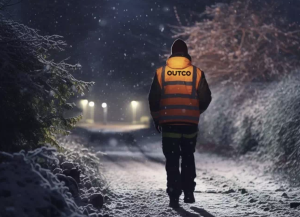Potholes are a persistent challenge for anyone responsible for managing hard surfaces. Whether in car parks, roadways, service yards or walkways, potholes pose safety risks, disrupt operations, damage vehicles, and increase maintenance costs. They may seem small at first, but when left unchecked, they worsen quickly, often leading to costly and time-consuming pothole repairs.
But what if the very tyres that contribute to their creation could also play a role in fixing them?
Thanks to advances in repair technology, we’re seeing the rise of a more sustainable, efficient, and future-focused method: Mastic Rubber Repairs. This innovation makes use of recycled tyres to repair potholes, ushering in a smarter and greener way to maintain your hard surfaces.
What Is a Pothole, and How is it Caused?

A pothole is a depression or hole in the surface of a roadway or paved area, usually caused by a crack forming over time which is then worsened by a number of factors such as water infiltration, freezing and thawing cycles, and the repeated pressure from heavy traffic, especially from larger vehicles. As vehicles pass over these weakened spots, the material breaks away, leading to the formation of potholes.
Tyres, particularly from larger or high-frequency traffic from vehicles, contribute to the problem by exerting repeated dynamic force on already vulnerable surfaces, worsening wear and accelerating failure.
Traditional Pothole Repair: A Proven and Reliable Method
Traditional pothole repair has long been the industry standard for rectifying damaged surfaces. It remains a highly effective and robust method, particularly when addressing deeper defects or areas where structural integrity has been compromised.
Conventional pothole repair typically involves:
- Excavating the damaged area and the surrounding surface
- Removing waste material and transporting it off-site
- Filling the hole with hot or cold asphalt
- Compacting the material using heavy machinery
While effective, and considered as the industry standard, this method can be time-consuming and energy-intensive, often requiring traffic management, extended downtime and is very labour intensive. This can also create significant waste and carbon emissions due to the fuels used for heating such as diesel and the compacting processes. For high-traffic or operationally critical sites, such as logistics hubs or healthcare facilities, traditional repairs can cause disruptions and higher costs.
Traditional pothole repair has long been the industry standard for rectifying damaged surfaces. It remains a
Mastic Rubber Repairs: A Greener Solution
Enhanced Rubber Polymer Technology (ERPT), commonly referred to as Mastic Rubber Repair, represents a modern approach to pothole repairs, and it’s already transforming the way we manage surface defects.
What is Mastic Rubber Repair?

Mastic rubber repairs are a modern, efficient, and environmentally responsible method of repairing potholes, using a blend of bitumen and rubber crumb derived from recycled vehicle tyres. Unlike traditional methods that require excavation and compaction, this process is pourable and flexible, allowing for a fast, low-disruption solution with long-term durability.
This flexible compound is engineered to bond with the existing surface and move with it, resisting cracking, water ingress, and deformation over time.
Crucially, the use of recycled tyres gives new life to a waste material that would otherwise be incinerated or sent to landfill, making mastic repairs a circular economy solution in action.
Mastic Rubber Pothole Repair Process
The first stage involves a visual inspection of the damaged area. This assessment identifies early-stage surface failures such as cracking, deformation, or forming potholes.
Minimal preparation is needed. Unlike traditional pothole repairs, there is no need for excavation of the defect or surrounding surface. The area is cleaned, dried, and preheated if necessary, to make sure the mastic bonds effectively to the existing substrate.
The mastic compound, composed of hot bitumen mixed with rubber crumb from recycled tyres, is heated in a mobile boiler or mastic kettle to the required working temperature. Once fully liquified, the material is then poured directly into the defect. Mastic rubber repairs are self-levelling, meaning it fills and seals the void completely forming an instant seal with the surface.
The material cures in as little as 20 minutes, making the repaired area ready for traffic far more quickly than with traditional asphalt repairs. This is a key benefit for:
- Operational sites that need to remain open
- High-traffic logistics yards
- Emergency or time-sensitive applications
Once cured, the mastic remains slightly elastic, thanks to the rubber content. This means the repair expands and contracts with temperature changes, absorbs heavy vehicle loading, and delivers long-lasting performance in both warm and cold climates, therefore helping to extend the life of the surface and reduce future intervention.
Why It Works So Well
The success of mastic repairs lies in their adaptability. They’re ideal for early intervention, allowing surface-level damage to be addressed before structural deterioration sets in. This makes them perfect for a proactive maintenance strategy.
Mastic can also be used alongside traditional repair methods in a hybrid approach, reserving more resource-intensive methods for areas of deep or structural damage, while using mastic to manage and prevent developing risks elsewhere across a site.
Key Benefits of Mastic Rubber Pothole Repairs: Faster, Reliable, and Cost-Effective
Sustainable Solution
- Made using recycled rubber from used tyres
- Generates zero waste to remove from the work site
- Consumes 80% less energy and uses 80% less material and consumes 80% less energy than traditional methods
- Can reduce the carbon footprint by 85%, helping clients hit environmental targets
Fast and Non-Disruptive
- Cures in just 20 minutes
- Can be applied directly to forming potholes without excavation
- Minimal equipment required, meaning less need for heavy plant
- Often requires minimal traffic management, keeping the site operational
Flexible and Durable
- The rubberised material flexes with the surface, resisting cracking and extending lifespan
- Proven durability, especially important on logistics sites and critical infrastructure
Cost-Effective
- Reduced downtime and faster repair turnaround
- Lower energy and equipment costs
- Prevents small defects from escalating, avoiding larger capital expenditure
Proactive Maintenance
- Mastic rubber can be used as a preventative measure, sealing early signs of wear before full potholes form
- Helps avoid the need for excavation and costly interventions in the future
- Supports a strategy of lifecycle maintenance, not just reactive repair
When Traditional Repair Is Still Required

While mastic rubber is ideal for many applications, there are cases where traditional repairs remain necessary, such as deep structural failure, sub-base damage, or large-scale reconstruction. At OUTCO, we assess the specific circumstances of each site and recommend the most appropriate solution whether mastic, traditional pothole repairs, or a combination.
OUTCO: Your Partner in Surface Repair Innovation
OUTCO provides hard surface maintenance services, combining traditional and advanced repair methods to suit every environment. We work closely with clients to understand their operational needs and long-term goals whether it’s promoting safety, minimising disruption, or hitting ESG targets.
With nationwide coverage and over 20 years’ experience, we deliver:
- Site assessments to identify the best approach
- Planned and reactive maintenance across all hard surface types
- Sustainable solutions that reduce lifecycle cost and environmental impact
Whether you manage a retail park, hospital estate, distribution centre or commercial property, OUTCO is here to help protect, maintain, and extend the life of your outdoor assets.
The Future of Pothole Repairs Is Here
Vehicle tyres have been a source of waste and environmental impact, but they can now be used to solve one of our most pressing surface maintenance problems. Mastic rubber pothole repair is not just a technical innovation, it’s a sustainability milestone. It’s quicker, cleaner, more flexible, and aligned with the future of responsible estate management.
By combining the reliability of traditional methods with the innovation of sustainable mastic technology, OUTCO ensures your estate remains safe, compliant, and cost-efficient. We don’t just repair potholes; we provide a smarter, more sustainable way to protect and maintain your outdoor assets.








